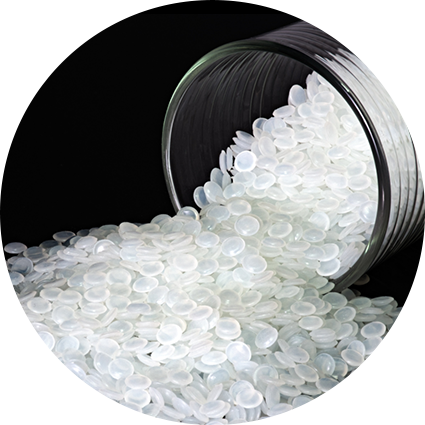Why Is Low-Temperature Resistance So Important in Modern Applications?
Traditional polyethylene materials often face performance degradation when exposed to subzero temperatures — becoming brittle, cracking, or losing elasticity. The PE+ST Polyethylene Resin SWJ/M-3503 solves this critical issue by incorporating a modified molecular structure that enhances flexibility and resilience even under extreme cold environments.
This means products made with SWJ/M-3503 maintain their softness, mechanical strength, and dimensional stability at temperatures as low as -40°C. Whether used in outdoor storage containers, industrial films, or refrigeration equipment, this material ensures consistent performance without material fatigue.
How Does PE+ST Polyethylene Resin SWJ/M-3503 Achieve Its Unique Balance of Properties?
The strength of Soft and Low-Temperature Resistant PE+ST Polyethylene Resin SWJ/M-3503 lies in its polyethylene-styrene blend technology (PE+ST). This innovative composition enhances the resin’s molecular flexibility while maintaining the structural toughness of polyethylene.
Below is a comparison table showing the superior performance characteristics of SWJ/M-3503 compared to conventional polyethylene materials:
| Property |
Conventional Polyethylene |
SWJ/M-3503 PE+ST Polyethylene Resin |
| Tensile Strength |
Moderate |
High |
| Flexibility at -30°C |
Poor |
Excellent |
| Impact Resistance |
Medium |
Superior |
| Surface Softness |
Average |
Smooth and Elastic |
| Thermal Stability |
Good |
Excellent |
| Environmental Resistance |
Standard |
Enhanced (UV and Weather Resistant) |
This data demonstrates how SWJ/M-3503 balances mechanical integrity with adaptability, making it suitable for complex engineering and consumer applications alike.
In Which Industries Does This Material Show the Greatest Potential?
The adaptability of SWJ/M-3503 PE+ST Polyethylene Resin allows it to be applied across a wide range of industries. In automotive manufacturing, it’s used for flexible seals, weather-resistant coatings, and cold-resistant interior components. The packaging industry benefits from its low-temperature toughness, which prevents cracking in frozen storage and transportation. In construction, it’s an ideal choice for insulation films, protective layers, and cold-climate piping systems.
Moreover, due to its soft texture and safety compliance, SWJ/M-3503 is also used in consumer goods like flexible containers, protective wraps, and durable outdoor equipment — ensuring both comfort and resilience.
How Does It Contribute to Sustainability and Energy Efficiency?
Beyond mechanical performance, Soft and Low-Temperature Resistant PE+ST Polyethylene Resin SWJ/M-3503 aligns with modern sustainability goals. Its energy-efficient processing, high recyclability, and long service life reduce overall environmental impact. The resin requires lower energy during molding, which minimizes production costs and carbon footprint.
Furthermore, its long-term durability reduces replacement cycles, promoting resource conservation in large-scale applications like infrastructure and logistics packaging.
What Are the Future Development Trends for PE+ST Polyethylene Resin Technology?
As demand for advanced polymers grows, SWJ/M-3503 represents just one milestone in the evolution of performance resins. Future innovations are expected to expand its applications into smart materials, electrical insulation, and medical-grade products, where both flexibility and reliability are crucial.
Researchers are also exploring nanotechnology integration to further improve thermal stability, chemical resistance, and bio-compatibility, creating next-generation polyethylene materials that can adapt to more extreme and specialized conditions.
Why Choose SWJ/M-3503 for Your Next Project?
Choosing Soft and Low-Temperature Resistant PE+ST Polyethylene Resin SWJ/M-3503 means choosing reliability, innovation, and long-term performance. Its unmatched combination of softness, cold resistance, and strength allows manufacturers to design products that endure — even in the harshest environments.
From a cost-performance perspective, SWJ/M-3503 stands out as an ideal solution for companies seeking a balance between flexibility, strength, and energy efficiency, while staying aligned with global sustainability standards.










